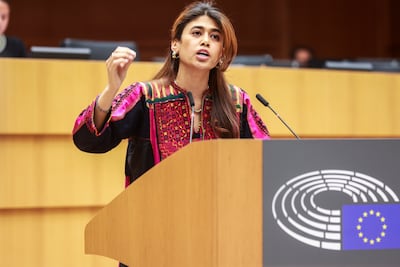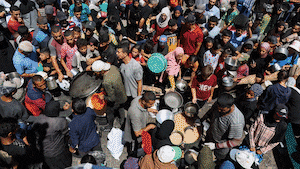In a sea of political grey suits, Rima Hassan, a 33-year old migration lawyer and firebrand member of the European Parliament, has come to embody France's pro-Palestinian movement.
Establishment views on her rise have mostly been sharply critical. Few in France's political mainstream are receptive to her post-colonial politics and campaigning for the application of international law to Israeli actions. Interior Minister Bruno Retailleau has filed a complaint accusing her of supporting terrorism. A prominent comedian has derisively dubbed her “Lady Gaza”.
In June, the France Unbowed politician gained international visibility by joining a Gaza flotilla alongside climate activist Greta Thunberg. She was held and then deported after the Israel military boarded the boat off the Palestinian enclave. Days later, this boost in profile saw Ms Hassan ranked 44th in a Ifop-Fiducial poll of France's 50 most popular figures.
In an interview with The National, Ms Hassan said she sees her role as a voice for the voiceless amid a rupture where, she says, those in power are not in sync with the new generation.
“I'm indeed very alone in [the European] Parliament, when you look at the average age and career path,” Ms Hassan said. “I come from civil society. I am not shaped by politics. It's really a question of what kind of platform people have access to.”
Daniel Levy
On Instagram, where she is wearing the traditional Palestinian keffiyeh in her profile picture, Ms Hassan has amassed one million followers. That makes the left-wing politician more popular on the platform than 29-year old far-right leader Jordan Bardella, whose National Rally party came first in last year's parliamentary election.
She uses her growing profile to push for a one-state solution that recognises both the Jewish and Palestinian Arab national identities, such as a Swiss-style confederation or a new type of umbrella state for two distinct nationalities.
It is a proposal often dismissed as a heresy that imperils the existence of the Jewish state. “There is nothing more pragmatic than the one-state solution,” Ms Hassan bats back. “The question of a [one] state is a demand which for me is the most progressive. There is a generational rupture in the understanding of the Palestinian cause.”
Ms Hassan said that the post-Oslo Accords generation, born in the 1990s like her, is rethinking what peace and justice must look like. “There's a lack of understanding about the new generation and its ideals,” Ms Hassan said.
“It goes beyond nationalist causes. It's about equality of rights and freedom of movement.”
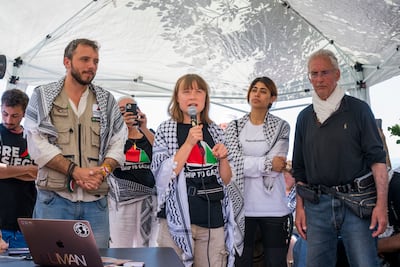
Before her deportation in June, Ms Hassan cut an olive branch to carry back as a reminder of the land from which her grandparents were expelled during the Nakba, after the formation of Israel in 1948.
Born stateless in a Palestinian refugee camp in Syria, Ms Hassan moved with her mother to France as a child. She is often referred to as Syrian though she only holds French citizenship − a framing some see as an effort to erase her Palestinian identity.
The olive branch memento now represents a personal triumph for Ms Hassan, who shed tears of rage when she failed to gain entry to Israel at age 18 having obtained French citizenship. Israeli security refused to let her on-board the plane at Charles de Gaulle Airport. She was not prominent at the time, though Israel often bars pro-Palestinians from travel.
From the margins
A one-state solution is an old idea first championed in the 1920s and later resurrected by the Palestine Liberation Organisation.
The concept was seemingly eclipsed by the global recognition of the Oslo Accords in 1993, though even at the time there was criticism these did not impose the creation of a Palestinian state. While the Palestinian Authority fell short, it was the first-ever recognition by Israeli leadership of the existence of a Palestinian people.
The rapid expansion of Israeli settlements and the increasing encroachment on the territorial integrity of that Palestinian entity, ultimately saw the Second Intifada break out in 2000. Years of stalemate and reverses on the ground, culminating in the Gaza war, has seen a groundswell among intellectuals and the younger Palestinian generation for a one-state pathway.
“I belong to a generation that starts from the observation that Oslo did not work,” says Ms Hassan. “And that there is a new paradigm which is that of apartheid," she added, referring to a notion backed by rights organisations that rules applied to Palestinians and Arab Israelis regarding freedom of movement and treatment by the judiciary amount to systemic discrimination.
Ms Hassan acknowledges that her vision remains marginal in UN and diplomatic circles. French President Emmanuel Macron has in fact promised a boost to a two-state solution with French recognition of a Palestinian state soon. Foreign Affairs spokesman Christophe Lemoine told The National the term “one state” was legally vague and politically impractical.
Behind closed doors, Ms Hassan said, some European diplomats privately concede that the two-state solution is no longer viable. “They tell me: I am obliged to support the two-state solution because it is the policy supported by the EU. But as a diplomat, my personal opinion is that it is not possible,” she said. “We have to get out of this paralysis.”
She points at Jewish organisations around the world that share her vision. Current Israeli cabinet members oppose both a one-state and a two-state solution, and a number have called for the expulsion of Gazans to unspecified destinations. The country is currently negotiating a Gaza ceasefire, but it has not meaningfully engaged with the Palestinian authority in Prime Minister Benjamin Netanyahu's present term. Ms Hassan believes in severe international pressure in response. An arms embargo and an end to privileged trade relations between the EU and Israel are among her main demands.
Former Israeli negotiator Daniel Levy argued Ms Hassan's self-proclaimed radical approach is essential to change power dynamics and become a worthy adversary to Israel – even if it takes a long time.
“It's about reframing the struggle,” Mr Levy told The National. “This is not about a solution that gets implemented tomorrow, because tomorrow you're not going to have two states. You're not going to have one state.”
“You frame the conflict in the way that Israel has now framed it, which is to create an apartheid state. And you challenge that. Then once Israelis realise there's a cost to it, they may change their position.”
Others are less generous. Mr Bardella has described her as the “Hamas ambassador at the EU,” a label rooted in her assertion that Palestinians have the right to armed resistance under international law.
While she has condemned as war crimes the October 7, 2023 Hamas-led attacks on Israeli communities in which about 1,200 people were killed and 240 abducted, Ms Hassan's output on X is a succession of sharply worded posts describing Israel as a terrorist and genocidal state.
Almost 58,670 Palestinians have been killed in Israel's Gaza strikes and ground offensive since the war began.
When asked, Ms Hassan says her focus on Palestinian rights during the explosive post-October 7 period is unapologetic. She has unsettled a political consensus that has seen relative disengagement of French diplomacy in the Middle East since late president Jacques Chirac left power in 2007. She has also been criticised for her muted criticism of the crimes of the former Assad regime.
Historic juncture
Ms Hassan's voice is part of a broader generational shift, said Leila Farsakh, professor of political science at the University of Massachusetts Boston. The brutal images coming out of Gaza are changing the global narrative. “The one-state solution's moment has arrived,” Ms Farsakh, a specialist of the Palestinian statehood question, told The National.
“We are today at a historic juncture − as important as 1948 or 1967 − and Israel is trying to reassert the supremacy of Jewish rights,” she said. “But Palestinians are much more vocal and present than in 1948 or 1967. They are able to articulate their rights and refuse subjugation.”
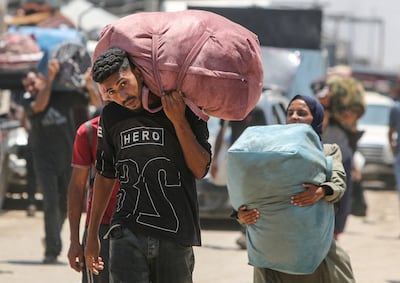
In French academia, scepticism is strong. Jean-Paul Chagnollaud, president of the Institute for Mediterranean and Middle East Research and Studies think tank in Paris, called a one-state model an “absurd dream”.
“The nature of a Jewish state entails a Jewish majority,” he said, pointing at demographics of seven million Palestinians, including Arab Israelis, and seven million Jews. “That means that even the most moderate Israelis would reject the idea of a Palestinian majority state.”
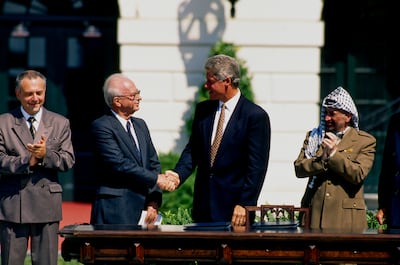
Like Ms Farsakh, Ms Hassan often cites the views of Palestinian intellectual Edward Said that Israeli state policy as “apartheid” was comparable with South Africa's historic racial segregation.
Israel rejects the use of the word apartheid and says separate legal and permitting measures or designations are linked to security concerns. Western countries, including France, resist using the term “apartheid” in relation to Israel.
For Ms Hassan however, it is the fundamental reality that must drive a solution to the conflict with her lifetime. “It is the paradigm of apartheid that really makes us understand demands to put forward a one-state solution,” she said.
“I don't see what's difficult to understand. The Oslo agreements were perhaps relevant at the time they were signed. What is the relevance of still referring to agreements that have constantly shown us that they have failed for the past 30 or 40 years?”
